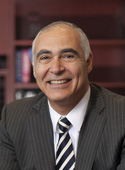A Message From the Chairman
 |
More than 10 years of persistent conflicts and escalating costs for domestic security, health care and energy have contributed to unprecedented deficit spending and a national debt that has become the most pressing concern of our time. Globally, the defense and security partnership that has matured over the years is threatened by fiscal policies in Europe, Latin America and the Asia-Pacific region.
In response, austerity measures have been enacted globally and domestically. The European Union is challenged with recent bailouts and the continued uncertainty over the future of the euro and the monetary and political union of its member nations. The U.S. Congress has passed the National Debt Relief Amendment (NDRA), which will impose reductions in all categories of spending beginning in 2013. The national security and defense strategies have been revised to accommodate these budget realities and the changing nature of the threat to freedom and global harmony. This new strategy calls for a reduction of more than $450 billion over the next 10 years.
Unfortunately, these changes may not be enough. The inability of Congress to reconcile the remaining gaps in revenue may force enactment of a provision within the NDRA known as sequestration, which will further reduce defense budgets by $500 billion, a situation Defense Secretary Leon Panetta and others have described as “catastrophic” and one that has uncertain implications across our strong network of allies and partners.
While these budget pressures create uncertainty and anxiety, they are not the only issues of concern. Terrorism will continue, both regionally and globally; new technologies will create an element of surprise; attacks on our cyberdependencies will persist; and the emergence of China as a global power will present new concerns.
Declines in discretionary spending, coupled with the evolving issues confronting us, call for new approaches that will enable us to rapidly design and deploy affordable and effective operational capabilities. Here, the forecast is brighter. The United States long has been a leader in bringing to the world advanced technology and game-changing ideas, and I am confident that it can continue that tradition. I am equally confident that the NATO restructuring will streamline and enhance operations to serve its 28 member nations with good resolve.
AFCEA has worked from its earliest days to foster the dialogue and collective awareness that support that spirit of progress. Our international members help bridge geography and culture for common purpose. For more than six decades, the association has hosted conferences, recognized achievements and sponsored educational opportunities. Today, however, AFCEA is confronting a more restrictive environment, and it must think differently about the role it should play.
Government organizations globally have become increasingly cautious about interacting with industry. And yet, the number of organizations hosting similar events on the same topics—such as cyber—is increasing. The result is lower participation and increasing distance between government and industry—a trend I find disturbing. When representatives from government gather with innovators from industry, academia, research centers and associations, then the process of innovation accelerates.
We must find new ways to bring thought leaders together to solve critical national problems. How can AFCEA members help? One way is to expand the AFCEA network by encouraging individuals to join the association. A related effort will be to strengthen the brand: Be an active participant by taking on leadership roles when you can. And, most important of all, members can be good stewards of the organization. Tell AFCEA what works and offer ideas for ways the association can improve.
I am proud to have been elected chairman of the board, and I am excited about working with the other board members. I want to extend my special thanks to Natalie Givans for her strong leadership as our immediate past chair and for the insights she shared with me as she passed the torch. I ask for your support in the months ahead and look forward to meeting you.




Comments